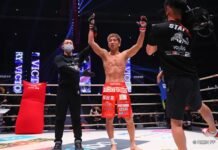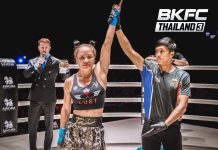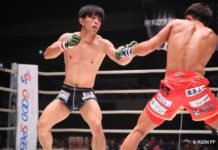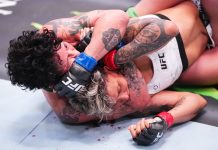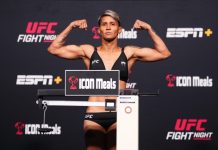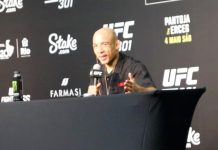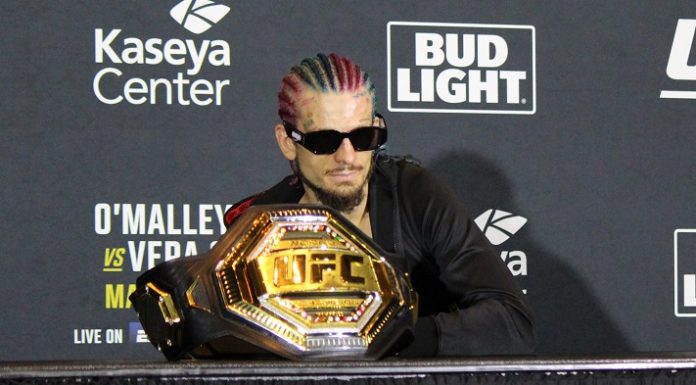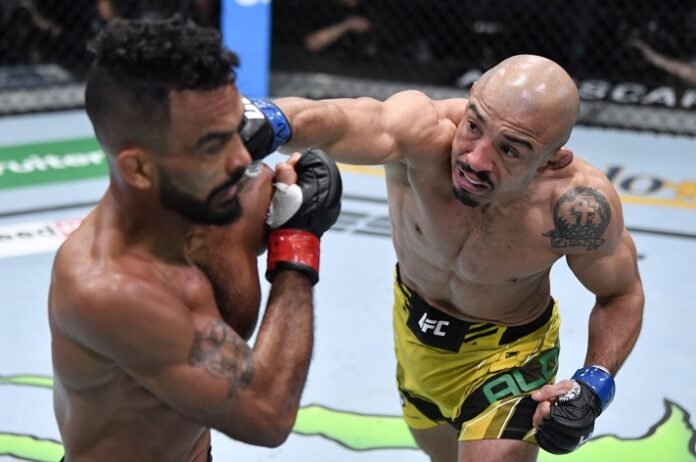
As José Aldo retires from mixed martial arts, we look back at the historic run by one of Brazil’s most decorated champions and the most consistent fighter in UFC history.
Once upon a time, a young boy from Manaus, Brazil named José Aldo had dreams of playing professional soccer. But bullying and fights on the streets lead him to martial arts to better defend himself, which in turn led a teenage Aldo to leave home to go train in the capital of his native homeland and embark on a journey that would earn him the title “The King of Rio.”
A nearly 20 year professional career in mixed martial arts began in 2004 where he blazed a trail primarily in Brazil to build a 10-1 record. His dynamic style got the attention of the WEC, the largest American promotion that housed the lighter weight classes at the time. He would make his debut at WEC 34 in 2008, competing in the second fight of the night on a card that featured names like Dominick Cruz, Urijah Faber, Jens Pulver, and Donald Cerrone.
The legendary WEC run of @JoseAldoJunior 🎞
[ #UFC278 | Saturday | @VivintArena | @StateOfSport | Live on ESPN+ PPV: https://t.co/U0PbshOSlW ] pic.twitter.com/mqpwevklBI
— UFC (@ufc) August 15, 2022
Few could imagine that the single setback he had in 2005 would be the only one he would suffer for the next ten years as he began his journey in MMA. A next generation athlete amongst the seasoned veterans of the division, “Junior” cut a path through the WEC rankings by earning a title shot with an eight second knockout of Cub Swanson to earn a title shot and claimed the title in 2009 against future American Top Team coach Mike Brown. He would go on to defend the belt against future UFC Hall-of-Famer Urijah Faber in what would go down as the most iconic example of his devastating leg kicks and later the resurgent Ultimate Fighter 5 finalist Manny Gamburyan.
His profile and personal brand grew when the UFC absorbed the WEC in 2010 and he was promoted to UFC champion. While his run would have been historic in any era, it should be noted that Aldo had the luck of arriving at a great time in the history of the promotion as his career largely coincided with the boom of the UFC as it entered network television on FOX and later ESPN. With a larger platform than ever before, Aldo embarked on a title run that ultimately saw him defend the title nine times.
While he was a blessed athlete, Aldo was also gifted with incredible talent for the sport of mixed martial arts. An adept grappler, Aldo rarely saw the mat during his career as he was notoriously difficult to be taken down. But Aldo’s game will be most remembered for his phenomenal striking as his speed and explosiveness made it seem as if he was on another gear entirely compared to opponents. In a testament to his abilities, he transitioned his game from using his devastating kicks to becoming one of the best boxers in the sport without ever slipping in the rankings.
Inside the cage, he built a Hall-of-Fame resume behind performances over the likes of former lightweight champion Frankie Edgar, Chad Mendes, “The Korean Zombie” Chan Sung Jung, Kenny Florian, and Mark Hominick.
The King of Rio 👑 @josealdojunior #UFCFortaleza pic.twitter.com/zKWKspWZzu
— ESPN MMA (@espnmma) February 3, 2019
A champion from a young age, Aldo also served to bridge the gap for the legacy of Brazilian title holders. As the UFC saw turnover with many of the elite talents from the late 2000’s, Aldo took the torch for his countrymen and women and carried the legacy as another all-time great to hail from the country. Few moments encapsulated his role and status in the sport back home as his 2012 victory over Mendes in Rio de Janeiro where he stopped the challenger at the buzzer of the first round and leapt into the throng of fans without stopping to hear the judge’s announcement or be interviewed by the announcer. To many, it was the performance that would cement his claim as “The King of Rio” in MMA.
If there was a knock on Aldo, it was the fact that his personality would clash with the familiar tropes of self-promotion. At times, his indifference toward staking his claim or pursuing marquee bouts would disconnect with the fan base that wanted to see him push to be all he could be. While other fighters were often encouraged to learn English to connect with the American market to grow their brand (and more importantly their earnings,) Aldo would continue to carry himself as he always had: doing interviews in Portuguese and eschewing bravado in favor of letting his skills and resume do the talking. While it was not a new approach, it is one that would occasionally downplay the magnitude of events he was a part of. In a business powered by promotion, if the athlete does not seem heavily invested than why would the fanbase be? While the hardcore fans of the sport knew and loved watching Aldo, he seemed to lack that invaluable spark that made him a mainstream star.
This demeanor made him the perfect half to his most high profile bout: his title unifier against future superstar Conor McGregor. While stylistically an exciting bout, the intrigue came from the fact that the two could not have been more different in terms of their public personas. The resume and mystique of Aldo’s dominance at the time, coupled with the lightening rod of attention brought by McGregor, made the bout groundbreaking for the UFC as they went on an unprecedented world tour that had stops in the United States, Brazil, and Ireland. Powered by the promotional dynamo in McGregor, even casual fans became invested to see if the boisterous challenger could fulfill the promise he literally proclaimed worldwide or if the steely champion could brutally silence the challenger’s insolence.
In the end, the bout stumbled at the finish line. After months of promotion, Aldo was forced out of the fight just two weeks out from the date and McGregor went on to defeat Chad Mendes for the interim title. Aldo and McGregor were rebooked months later, but the fever pitch was never quite the same. When the two finally did compete, it was an electrifying yet anticlimactic ending. McGregor would clip Aldo on the chin 13 seconds into the fight and unceremoniously ended the 10 year and 18 fight unbeaten streak of the champion.
Aldo’s longtime approach to promotion worked against him in the aftermath. Normally such a dominant champion would be guaranteed an immediate rematch without hesitation. But the popularity of McGregor was too much for the UFC not to capitalize on as both the Irishman and the promotion moved on to bigger bouts for “The Notorious.” For the next several years, the cloud of the loss to McGregor never quite seemed to dissipate as even claiming interim gold after his rival moved up to lightweight never did allow Aldo to escape the criticism that he was now the second best featherweight in the world.
The king of Rio is BACK 👑
Flash🔙 to @JoseAldoJunior's last performance at #UFCCalgary. #UFCFortaleza pic.twitter.com/DIUAHVkyS1
— UFC (@ufc) February 1, 2019
The loss coincided with a turnover in the featherweight division. After reclaiming gold in the absence of McGregor, Aldo would soon encounter up-and-comers Max Holloway and Alexander Volkanovski with the former taking the title. As both contenders went on to establish themselves as the new kings of the roost at featherweight, Aldo made the decision to move down to bantamweight but would drop his divisional debut to Marlon Moraes in 2019.
The last several years were a renaissance of sorts. Opportunity would present itself for the former champion to compete for UFC gold again at 135 pounds, but he would come up short to Petr Yan in 2020. Aldo showed he was still amongst the best as he overcame the challenge of current top contender Marlon “Chito” Vera. He would follow up that victory with a timeless performance against Pedro Munhoz in which he displayed that even at this stage of his career he was still on an elite level. But on the penultimate fight of his contract last month, Aldo found himself stymied by Merab Dvalishvili in a listless decision loss that saw little action from both men.
The King of Rio returns to action this Saturday 🇧🇷
[@JoseAldoJunior | #UFC265 August 7th live on @ESPN+ PPV] pic.twitter.com/K14vf5TZJy
— UFC (@ufc) August 2, 2021
The future for Aldo appears to be motivated by more of what we have come to know: his love for competition. After previously setting a date for his retirement and fueling rumors that he would be leaving the sport in 2019 with plenty left to offer it, Aldo signed a new 8 fight contract and turned it into his bantamweight run. Today, after welcoming a new son, the door remains open for Aldo to explore the option to try professional boxing as he has previously expressed for years. With a legacy in mixed martial arts secure, one can imagine Aldo sees the potential for further glory and financial gain as the boom of mixed martial artists crossing over to boxing begins to grow. More than a decade younger than his countryman Anderson Silva who is coming up on his own lucrative bout with Jake Paul, it is not difficult to see Aldo potentially having a second life in combat sports if he so desires.
Jose Aldo ends his MMA career with a UFC Hall of Fame resume. 👑
Full story: https://t.co/vPK6dmcgAy pic.twitter.com/9HUgK4yGTc
— MMA Junkie (@MMAJunkie) September 18, 2022
For now, the career of Aldo will go down as one that was defined by letting one’s skills do the talking. “The King of Rio” spent more than a decade as either a champion or in title contention without ever falling far from a return to the summit. An athlete who evolved and grew while at the top of the mountain, he grew up in front of our eyes without ever providing a hint of controversy. While Aldo is known for embracing the nation that embraced him back and etched his own name amongst he predecessors from Brazil, he leaves the sport as a respected champion who’s abilities drew the respect of fans and his peers worldwide.




